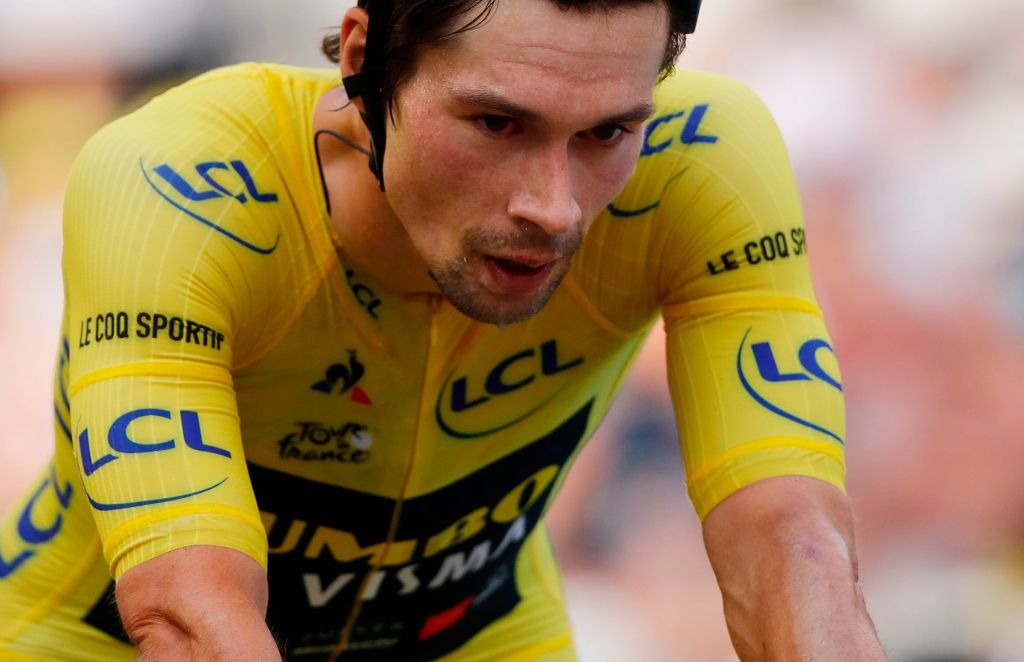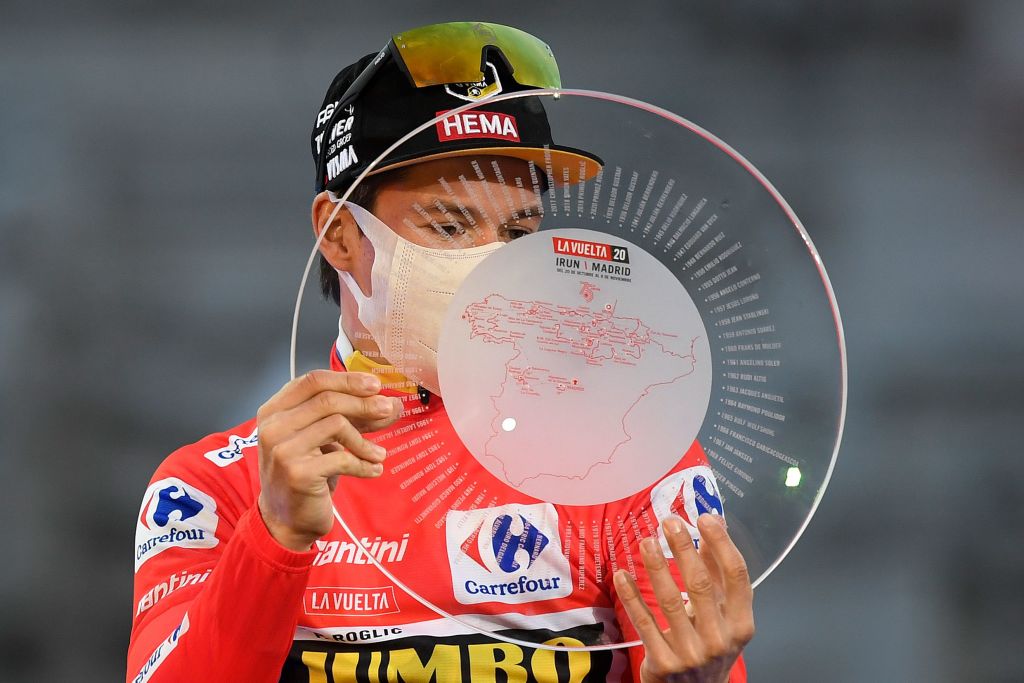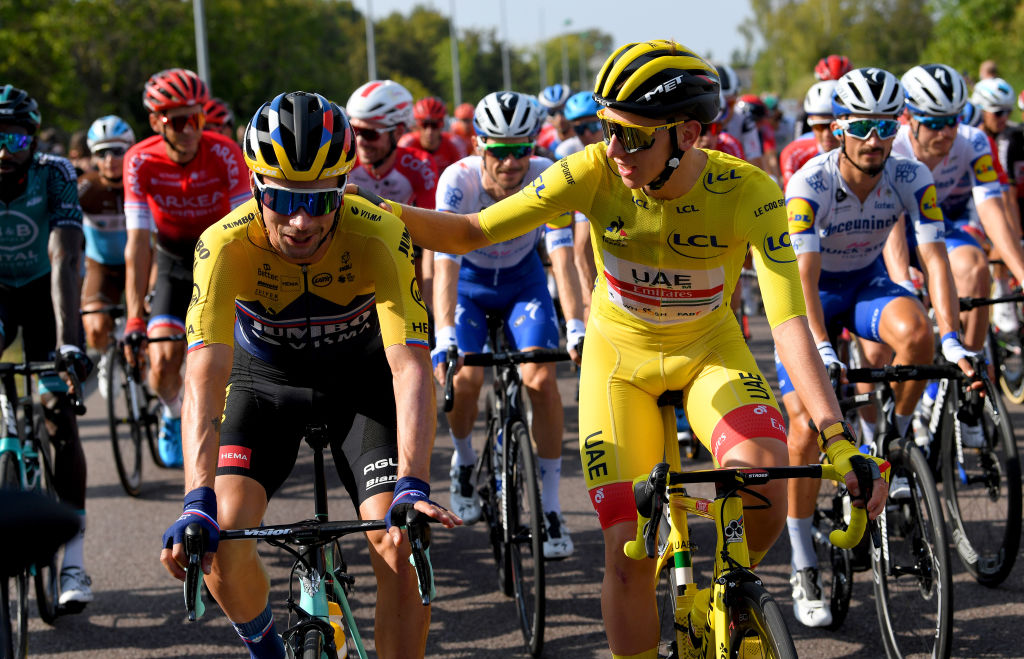Primoz Roglic opens up about defeat at the Tour de France
'I prefer to remember that I fought for every metre of the race'

Primož Roglič has spoken at length about losing the 2020 Tour de France to Tadej Pogačar in the final time trial, describing defeat as “brutal, devastating” but also insisting he has shaken off the disappointment and is looking forward to another season of training and preparation for the Tour de France.
“Defeat was brutal, devastating. But more for the people around me than for me. I’m someone who likes to keep moving forward, I don’t get hung up on a result,” Roglič told French newspaper L’Equipe while in the ski resort of Tignes during the holidays and into early January.
“If I look back at the Tour, while second place was frustrating at the time, it’s still a great result. I told my teammates that our victory showed how strong we were as a team, our combined strength and the way we controlled the race. That was what we wanted to do before the start and that is what we managed to put in place. Of course, I didn’t win but sometimes you win, sometimes you lose. When you've done everything you can, you have to accept it.”
Jumbo-Visma leader Roglič only seems to have one regret about those three weeks in September.
“That I should have grabbed a few seconds in several moments during the race,” he said. “But it would never have been enough to take nearly two minutes on Pogačar. I prefer to remember that I fought for every metre of the race.”
The “Code Yellow’ documentary produced for Dutch television revealed the inner emotions at Jumbo-Visma during the Tour de France and captured the team’s amazement at Pogačar's performance in the La Planche des Belle Filles time trial.
Tom Dumoulin was especially shocked, as was Roglič. “I still cannot understand two minutes, that’s a big difference,” he said an hour after his defeat while sat in a car with team manager Richard Plugge.
Get The Leadout Newsletter
The latest race content, interviews, features, reviews and expert buying guides, direct to your inbox!
“I don’t know…they have to calculate what kind of power to achieve that time. That is just a different world. I cannot understand it. If you can ride so hard then every stage you have to be with one leg.”
Jumbo-Visma have since backtracked on their criticism and Pogačar has also shrugged it off. Roglič still appears somewhat stunned by his fellow Slovenian’s performance.
“It wasn’t strange, it was surprising,” he told L’Equipe.
“Because he’d never shown that it was possible, until the moment he crushed the time trial. On certain stages, previously, he was at the limit, on the verge of letting go. No one could imagine he still had it in him.”
He also talked about ‘that’ yellow time trial helmet, which seemed so uncomfortable, clearly not very aerodynamic, and a distraction as he tried to limit his losses to Pogačar.
“I would have preferred to go with the old model, I said that before the race but I was assured that this one was more aerodynamic,” he explained.
“But it only cost me a few seconds… If I hadn’t crashed hard at the Dauphiné, if I wasn’t injured before the Tour, I might have been able to win. But what can I do? I can’t change anything.”
Roglič confirmed that his crash at the Dauphiné left him with a huge bruise around his left hip and the pain was so bad that he did not train on the road before heading to Nice for the start of the Tour de France.
Bouncing back from defeat

Despite his defeat, Roglič was admired for the way he bounced back and won Liège-Bastogne-Liège and especially the Vuelta a Espana, where he battled with Richard Carapaz and High Carthy, winning in Madrid by 24 seconds.
After switching from ski jumping to professional cycling when already in his 20s, Roglič is keen not to waste every year of his professional career and every opportunity. He refused to let his head drop after defeat at the Tour de France.
“It didn't even cross my mind to stop racing after the Tour,” he said.
“I love what I do. I'm 31 and I know it won't last forever. I want to take advantage of the moment when I'm on form, I don't want to let myself down. When the Tour ended, I told myself that I had worked too hard, that I couldn't stop there. I wanted more.”
He enjoys the process of preparing for a major goal like the Tour de France rather than worrying about if he will ever win the sports biggest race.
“I don't burden myself with questions like that, if I’m going to win again or what,” he said. “I want to be number one but in truth, what I like most is the build-up to it all. How do I reach my limits? How to push my teammates, my staff?
“It’s actually very harmful to have only victory as a goal. If you are second, you are finished, you no longer find the strength to start all over again. It prevents you from enjoying the preparation. Me, I'll be super happy if next season I can improve by 0.5 per cent.”

Open to criticism, ready to learn
Roglič has laid the foundations for the new season with cross-country skiing sessions and riding on the home trainer in Tignes, only returning to his home in Monaco in mid-January to start more serious training.
He was unable to attend the Jumbo-Visma training camp in Spain after coming into close contact with a COVID-19 case, but has time to prepare for 2021 with his racing debut planned for Paris-Nice in early March.
Roglič has already been named as Jumbo-Visma’s team leader for the Tour de France along with Steven Kruijswijk, while Tom Dumoulin’s role in a possible trident depends if he will return from his time away from the sport. He can appear distant and reserved when he speaks but he admits he is shy and is learning to be more of a leader and team player at Jumbo-Visma.
“That’s never been easy for me,” he admitted. “I came from such an individual sport, where you are completely focused on yourself, where you think a lot about the mental aspect, your feelings, your technique. Cycling is much more collective. I had to learn that from others. I’m still trying to figure out how to be a good leader and I have to work on how to get my guys around me. It's not very natural for me.
“For example in the early days, on days off the guys get together, go out for coffee, chat and laugh. But I preferred to be alone, to ride alone. At first I didn't bother to talk about it and the guys thought I didn't like them, they thought I felt special, that I focused on myself."
Roglič can still seem elusive, especially with the media but is gradually becoming more comfortable with his status as one of the stars of the sport and a real Tour de France contender.
“I’d say I'm open to criticism,” he said. “I appreciate being told when I’m wrong, I take it as a challenge to become better, to improve. It's a way to learn."

Stephen is one of the most experienced member of the Cyclingnews team, having reported on professional cycling since 1994. He has been Head of News at Cyclingnews since 2022, before which he held the position of European editor since 2012 and previously worked for Reuters, Shift Active Media, and CyclingWeekly, among other publications.